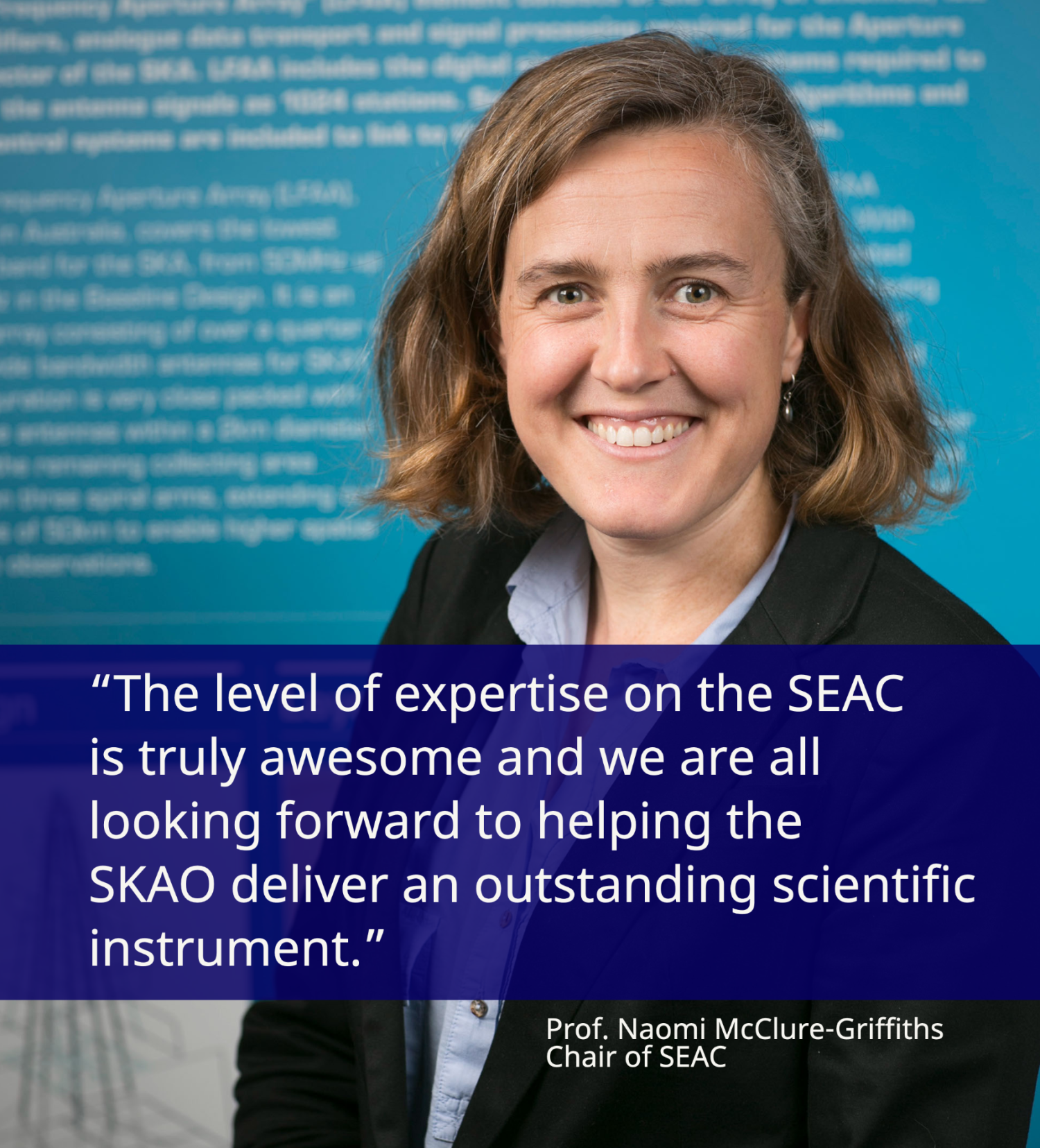First meeting of the new SKAO Science and Engineering Advisory Committee
The SEAC is a key independent advisory body to the Council and SKAO Director-General, and is populated by 18 science and engineering experts from the SKAO’s member countries and beyond. SEAC members, who are appointed to three-year terms, are highly regarded specialists in topics of particular relevance to the SKAO.
Prof. Naomi McClure-Griffiths, based at Australian National University, will be the first Chair of the committee.
“I’m really proud to be chairing the first SEAC of the SKAO. SEAC has an essential role in providing independent advice as the Observatory moves through construction towards operations,” said Prof. McClure-Griffiths. “The level of expertise on the committee is truly awesome and we are all looking forward to helping the SKAO deliver an outstanding scientific instrument.”

The SEAC provides advice on a wide range of science matters: the scientific scope of the project, science operations, scientific data management, high performance computing and technology development programmes. During the SKAO telescopes’ construction phase, due to begin in the next few months, the committee will also provide technical and engineering advice to support delivery of the Observatory.
While each SKAO Member has a representative on the SEAC, they are appointed as experts in their own right and do not represent national interests. The SEAC also includes representatives from countries with observer status at the SKAO Council, and up to five representatives-at-large (nominated by the Director-General) to provide specialist expertise, who may be from countries beyond the Observatory’s membership.
“The SEAC members are experts in their respective fields and together will provide an essential independent voice to help to guide the SKAO’s activities. I am grateful for their voluntary contributions and their dedication and very much look forward to working with them in the coming years,” said SKAO Director-General Prof. Philip Diamond.
The committee’s establishment is a requirement set out in the SKAO Governance Framework, and its advice is based on the consensus view of the committee. A Science and Engineering Advisory Committee also existed under the Observatory’s forerunner, the SKA Organisation, and some of its former members are part of the new committee to ensure a seamless transition and knowledge transmission from the pre-construction phase of the SKA project to the construction phase.
The membership of SEAC is as follows:
| Country | Representative | Affiliation |
| Australia (SKAO Member) | Naomi McClure-Griffiths (Chair) | Australian National University |
| Canada (SKAO Observer) | Kristine Spekkens | Royal Military College of Canada |
| China (SKAO Member) | Zheng Qian | Shanghai Observatory |
| France (SKAO future Member) | Guilaine Lagache (from September onwards); interim until September is Marc-Antoine Miville-Deschênes | Laboratoire d’Astrophysique de Marseille |
| Germany (SKAO Observer) | tbc | |
| India (SKAO Observer) | Uday Shankar | Raman Research Institute |
| Italy (SKAO Member) | Andrea Ferrara | Scuola Normale Superiore, Pisa |
| The Netherlands (SKAO Member) | Wim van Cappellen | ASTRON |
| Portugal (SKAO Member) | Cláudio Melo | Portugal Space |
| South Africa (SKAO Member) | Francois Kapp | SARAO |
| Spain (SKAO future Member) | Antxon Alberdi | Instituto de Astrofísica de Andalucía |
| Sweden (SKAO Observer) | Garrelt Mellema | Stockholm University |
| Switzerland (SKAO Observer) | Andre Csillaghy | University of Applied Sciences and Arts |
| United Kingdom (SKAO Member) | Carole Mundell | University of Bath/FCDO |
At-large members
| Representative | Affiliation |
| Brian Glendenning | NRAO (USA) |
| Justin Jonas | SARAO (South Africa) |
| Andreas Kaufer | European Southern Observatory |
| Adrian Russell | European Southern Observatory |
| Gillian Wright | UKATC (UK) |




